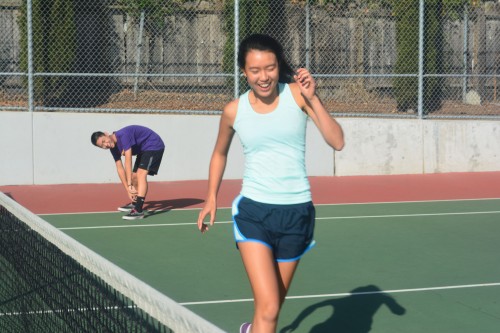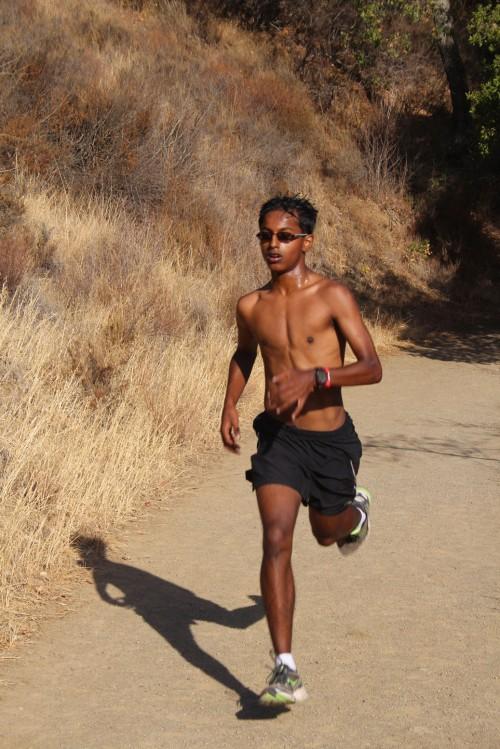A lthough MVHS sports seasons only run three months of the year, many Matadors begin the season better than how they left off. Not only do they remain fit, they also improve their skill. Whether going through speed drills or running 60 miles a week, these Matadors find that off-season practice, especially with friends around, helps start the season off right.
True team practice
At school tennis practice, juniors Uma Kirloskar, Sarah Lim and Austin Chan hardly sweat. Instead they end up laughing and occasionally playing games.
“School practice is more for [finding] who you work well with,” Chan said.
However, these three CCS-level tennis players do sweat at their clinic for 2.5 hours, four times a week year-long. At Cuesta Park in Mountain View, their coach Daniel Schnapek runs this clinic for approximately 20 athletes. Each practice includes warm up runs, dynamic stretches, more runs, games, punishment runs, two rounds of drills and matches, with water breaks interspersed throughout.
Kirloskar and Lim began playing tennis in middle school. Then, in seventh grade, Kirloskar introduced Chan and his brother freshman Justin Chan to the clinic.

“I’ve never been happier anywhere else,” Kirloskar said. “It’s easy to make friends when you have a common interest.”
Chan, Lim and Kirloskar agree that they wouldn’t have made the school team if it weren’t for the clinic. The players need to improve constantly so that they can remain competitive during the season. While school practice focuses on team cohesion, the clinic emphasizes developing individual skills.
“It’s about improving so you can make it to the higher level during the season ” Chan said.
Running ahead
When senior Rohan Choudhury started cross country in sixth grade, he didn’t take it very seriously.
As a freshman, Choudhury grew to enjoy cross country. Now a third-year varsity cross country runner, Choudury is one of the fastest on the team. On Oct. 2, Choudhury placed fourth at a league-wide tournament among 94 runners and first at the Artichoke Invitational on Oct. 4. His year consists of cross country, off-season, track and field and off-season.
“Off-season training is really important for running [because] if you do not do it you’re going to enter the season out of shape,” Choudhury said. “It’s also a really good opportunity to improve.”
During the school season, Choudhury focuses on speed. The team runs roughly 50 miles per week, and it’s the fastest 50 miles they can run.
“[In the off-season] you have a lot of time to do a lot longer runs,” Choudhury said. “We call that base mileage. If you do base, you’re building a lot of muscle.”
While a run during the season is five to seven miles, an off-season run can be 13 to 14 miles. Since these runs can get long, he trains with a small group of people that can keep up with him.

Senior Akshay Thontakudi, on Choudhury’s off-season team, finds that training with Choudhury is inspirational. Over the summer, Thontakudi and others reached 55 miles per week, and Choudhury made it to 60.
“I enjoy training with him because he is a goal that I always have in front of me,” Thontakudi said.
Choudhury introduced Thontakudi to long distance running their sophomore year, and when they train together, Choudhury helps him keep his pace.
50 miles per week for two seasons, and 60 miles per week for two off-seasons may seem tough — for Choudhury, it’s relaxing. Choudhury is waiting to see if he can take cross country to college and make it a part of his future.
“It would be kind of weird if I stopped,” Choudhury said. “I don’t know what I’d spent my time doing.”




